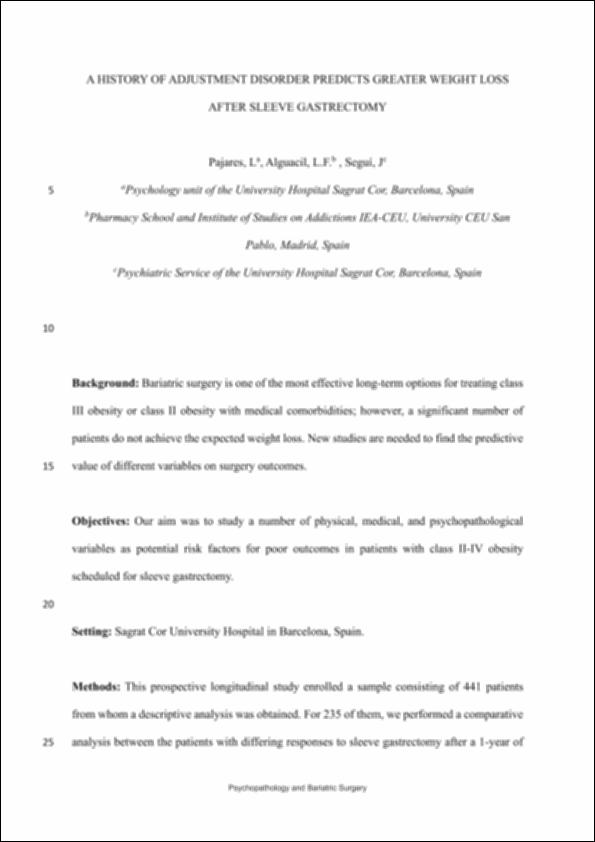Por favor, use este identificador para citar o enlazar este ítem:
http://hdl.handle.net/10637/15369A history of adjustment disorder predicts greater weight loss after sleeve gastrectomy
| Título : | A history of adjustment disorder predicts greater weight loss after sleeve gastrectomy |
| Autor : | Pajares Arribas, Laura Alguacil Merino, Luis Fernando Seguí Montesinos, Juan |
| Materias: | Adjustment disorders; Bariatric surgery; Predictive variables; Psychopathology; Sleeve gastrectomy |
| Editorial : | Elsevier |
| Citación : | Pajares Arribas L, Alguacil Merino LF, Seguí Montesinos J. A history of adjustment disorder predicts greater weight loss after sleeve gastrectomy. Surg Obes Relat Dis. 2022 Nov;18(11):1269-1276. doi: 10.1016/j.soard.2022.07.004. |
| Resumen : | Background: Bariatric surgery is one of the most effective long-term options for treating class III obesity or class II obesity with medical co-morbidities; however, a significant number of patients do not achieve the expected weight loss. New studies are needed to find the predictive value of different variables on surgery outcomes. Objectives: Our aim was to study a number of physical, medical, and psychopathological variables as potential risk factors for poor outcomes in patients with class II-IV obesity scheduled for sleeve gastrectomy. Setting: Sagrat Cor University Hospital in Barcelona, Spain. Methods: This prospective longitudinal study enrolled a sample consisting of 441 patients from whom a descriptive analysis was obtained. For 235 of them, we performed a comparative analysis between the patients with differing responses to sleeve gastrectomy after 1 year of follow-up. The remaining patients had differing follow-up data or were lost to follow-up. To collect the data, a semi-structured interview was conducted, and various tests were administered to assess the patients' psychopathology (Hamilton Rating Scale for Depression, Hamilton Anxiety Rating Scale) and functionality (Global Assessment of Functioning Scale). Results: The results show the prognostic relationship between certain presurgery variables and the good or poor outcomes of the bariatric surgery, based on the patients' weight loss. Advanced age, high body mass index, diabetes, and respiratory problems were significant predictors of a poor response to surgery. Contrarywise, a history of adjustment disorder predicted a better response. Conclusions: The results allow us to conclude that, beyond well-established physical and medical conditions, a psychopathological study of patients prior to bariatric surgery including adjustment disorders could be predictive of therapeutic response and could help to personalize the follow-up. |
| Descripción : | Este artículo es la versión aceptada siguiendo la política de la revista |
| URI : | http://hdl.handle.net/10637/15369 |
| Derechos: | http://creativecommons.org/licenses/by-nc-nd/4.0/deed.es |
| ISSN : | 1550-7289 |
| Fecha de publicación : | nov-2022 |
| Centro : | Universidad San Pablo-CEU |
| Aparece en las colecciones: | Facultad de Farmacia |
Los ítems de DSpace están protegidos por copyright, con todos los derechos reservados, a menos que se indique lo contrario.


